|
James Lumsden (1839,
Haddington – 1909, Edinburgh)
A Significant East Lothian Author
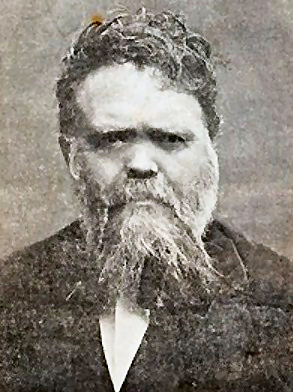
The following information has
been gleaned from the 'John Gray Centre' in Haddington, East Lothian,
Scotland, Lumsden's publications, and John Henderson's genealogical research
........
James Lumsden aka 'Samuel Mucklebackit', was the author of several books of
poetry, short tales and plays, in the late nineteenth and early twentieth
century. Among these are many items in Scots and English about places in
East Lothian. Also, if one reads between the lines, these tend to suggest
that there is a core of reality around which Mucklebackit's writings relate
to incidents in, and aspects from, James Lumsden’s own experiences.
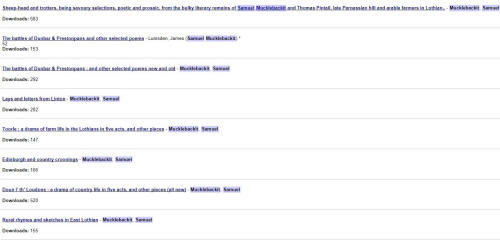
REFERENCE:
http://archive.org/search.php?query=samuel%20Mucklebackit%20AND%20mediatype%3Atexts
For example:
AULD HANSEL MONDAY
[As it was held in the East Country in my Young Days.]
Composed by 'Samuel Mucklebuckit' in 1892
and published in,
EDINBURGH AND COUNTRY CROONINGS - 1905
Selections from the Shorter Poetic Writings of JAMES LUMSDEN
Whan grim King Winter hands his reign
Mang trains o' gloom appearin',
Auld Hansel Monday comes again
Wi' routhy mirth an' cheerin' ;
His look is like the Freend o' Man's—
To auld and young endearin' ;
A haill year's walth is in his han's—
He scatters without fearin'
To a' this day !
His bags are fou o' wondrous cheer,
His social face is glowin'
Wi' heartfelt glee—tho' whiles a tear
Doun his fat cheek is rowin' ;
On happy auld lang syne thinks he !
But shortly does it tout him,
For auld Scots hospitality
Mak's a'thing round about him
Blythe, blythe this day !
Hail, merry morn ! the puir man's day !
When furth the cottar's fowre wa's
Care packs him aff without delay
To wail in touns his puir cause !
Then ilka en', Jock's butt and ben,
The lichtsome foot on floor fa's,
O' rustic joy, ne'er shy nor coy
When Time a fittin' hour shaws,
As now this day.
By screich o' morn the bairns are up,
And loud the auld folk rousin' ;
What braws are donn'd, what sangs are conn'd,
What daffin' an' carousin' !
The parritch pat this morn I wat,
The mice themsel's may doze in—
On rarer fare baith rich an' puir
Do deeply shute their nose in
Wi' joy this day !
Their wames appeas'd, the young an' stout
Maun graith them for the shootin' ;
And mony a queer gun's huntit out.
And bullets ticht to put in.
Tam shouthers ane like a rain spout—
A roostit Copenhagen,
That 'even Auld Nick wi' couldna shute,"
As Pate confides the lug in
O' Jean this day !
Afif wi' the lads—we leave a while
The auld folk, bairns, and lasses,
Wha cosh at hame, shall time beguile
Wi' ilk kenn'd freen' that passes ;
Sae, brisk and bauld, we jump the stile,
And for the toun address us,
Owre wintry roads, for mony a mile
Thick-thrang wi' maist a' classes,
Lat lowse this day !
The toun stands ilka side a burn,
That loups a rockie linn there,
And as below the brig we turn—
Oh, Wow ! the deavin' din there !
The Linn, galore, did ramp an' roar.
And trains an' crowds cam' in there ;
And whalm'd and whirl'd, and brawl'd an' birl'd.
And vortex-like did spin there.
This awfu' day !
The 'Red Lion's' fount our drouth maun slake
Wi' genial Jamie's best ane,
Syne to the Games, weel-primed, we'll make.
And see the grand contestin' !
Within a ring o' hemp an' stake,
Some chields their claes are castin'.
While shifting crowds around them break
In laughter loud an' jestin',
Richt gleg this day !
In skin-ticht duds o' flannel soy,
They loup, and rin the races ;
Lang, lang they've practised for this ploy,
Noo they maun shaw their paces.
But vain, alas ! Baith man and boy
The day ere lang disgraces ;
Few win, maist fa' and sair destroy
Their braws, or splairge their faces
Wi' glaur this day.
Hammers and cumbrous caubers now
Like willow wands they're swingin' ;
Wi' wild huzzas at each big throw
The startled lift is ringin' ;
But we maun go—the targets, ho !—
And leave the giants flingin'
Their shafts an' dread bolts to an fro.
Like Jove, some god-fae bringin'
To grief this day !
" Three shots a shillin' !—bleeze awa' ;'
A sturdy auld carle cries us,
As we draw near the butts in fear
O' burstin' guns' surprises ;
"A muckle cheese, twa chairs an' a',
Forbye some tea, 's the prizes,
Ma faith ! he is nae man ava
Wha comes an' never tries us
Ae round this day ! "
Dick shouthers first the trusty gun
That craw-herd Johnnie lent him
(Wha chuckie stanes wi't, mony a pun',
Amang the sprugs had sent 'em),
He took a lang and deadly aim
At the bull's e'e fornent him,
Syne steekt his een, an' fired as game
As gin his lass ahint him
Look'd on this day !
Whare did the wayart bullet speed ?
Gae speir in Beanston Valley ;
The muckle target, richt a-heid.
It cleared as clean 's a swallow !
Tarn neist for " Copenhagen " paid
His last bob—but, puir fallow,
Not even a lowin' clout to 't laid
Could coax a single volley
Frae it this day !
Lang, lang, wi' friendly joke an' crack
The crowd gart muskets smack there,
But gif the target e'er ane strack
We didna stey to mak' sure.
On leaving, as we keekit back.
All huge in white and black there.
It stude, defying the haill pack.
As lairge, and as intack there,
As Sol this day.
Sune ran we hame wi' anxious haste
For our grand Hansel denner,
Pork chops and dumplins—lord a feast—
A gorge for saunt or sinner !
Our country core were a' weel braced,
And wearyin' to begin her ;
The board's richt eithly spiced an' graced
That's spread for health an' hunger
Like ours this day !
The furious onslaucht, knife and fork,
Was a' owre in a whuffy,
Sae weel our tusks an' talons work
In this wee glorious jiffy,
At Prestonpans his Hielant dirk
Nae clansman plied mair stuffy,
Than did our lads their weapons yerk
Amang the creesh an' taffy,
In lochs this day !
And aye atween the stechs, galore.
We pree the tither drappie,
To synde the gusty mouthfu's owre
And clear our claggit crappy ;
Ilk lad and lass their glasses pass,
And touzzle owre the nappy ;
The auld folk see, but let a-bee,
And wyte the time sae happy
For pranks this day !
When toasts were dune and things aside,
In stumps auld Andrew Brodie,
Wha in his oxter, like a bride,
His fiddle braucht, blythe body ;
He screwed her up wi' conscious pride.
And rosin'd her that snoddy.
He saw'd us aff sweet Kelvinside,
Like Gow, inspired wi' toddy
And sneesh this day !
Syne sune wi' reels, an' strathspeys even,
The wee cot housie dirled,
As a' the blasts o' yearth an' heaven
Were 'gainst its boukie hurled ;
Braw lads and lasses lap and skirled
Wi' men, and folk wha'd striven
Man's number'd years in this hard world.
An' 'heuch'd' like warlocks driven
Clean gyte this day !
But daffin' jigs, an' sangs, an' tales,
Sped far too swith the hours on,
For freends were met whom morrow's gales
Wad waft apart life's course on
Anither year, and maybe ne'er
Again while time's flood roars on,
Might they e'er meet, or even greet,
This fickly warl's shores on,
Tho' here this day !
Weird hopes and fancies fill'd each heart,
A wild fond sadness moved us ;
We lingered lang—sae laith to pairt,
And the 'farewell,' it proved us !
But blessings on that Hansel ploy,
It aye the mair behoved us.
To pray the Powers—for oh, what joy
It braucht wi' those wha loved us.
This matchless day !
Lumsden writes about Hansel
Monday .....
"Hansel Monday, the first Monday of the new year, was equivalent to Boxing
Day in England, etc. Auld Hansel Monday was the first Monday after the 12th
of January—New Year's Day, old style. Both days originated from the same
ancient custom.
Up to the period of the Reformation, there were certain well-defined and
marked holidays and festival seasons, and Christmas, or Yule, was the chief
one in Britain. Prior to the Reformation in Scotland, and in feudal times,
it was customary for the lord of the Manor to present his retainers, etc.,
with a 'box,' or gift, hence Boxing Day.
After the overthrow of the Papacy as the established religion, the stern
Presbyterian divines, it is recorded, proved themselves so zealous for the
new faith that they even forbade their congregations to observe the ancient
holidays, and even Christmas—in many parts—was to be obliterated at once, as
advised in every Reformed pulpit in the country. The very buskings of Popery
were to be destroyed, and not a visible shred of them to remain. In pity,
however, for the loss of the old Yule, those ardent theological reformers
humanely granted their devoted followers a gift, or Hansel Day, which they
appointed should be the first Monday of the year, old style.
In Banff, Fife, Peebles, and other parts, Hansel Monday—the first Monday of
the year, new style—is still in a fashion observed, but it was only in East
Lothian that Auld Hansel Monday was recognised and observed in anything like
its pristine glory in our day.
It was there— even only a few years since - truly a hallowed name to East
Lothian men, women, and children. With it were associated feelings, and
thoughts, and fond longings, and memories of the human heart, peculiarly of
the tenderest desires and recollections of the family and the fireside
circle, and every home tie that a leal and loving heart holds dear.
From the busy and confounding
towns and cities came the servant girls, the shop boys, and the artisans
back that day to their native calf-ground. Whole families were
re-united—with, here and there, alas, a dear one missing. In the rapid
glance of the eye, in the warm and vigorous grasp of the hand, untold
volumes of well-understood meaning were conveyed by Scots men and women to
one another on Auld Hansel Monday morning. The village streets, from an
early hour, were thronged with visitors. The early trains brought in large
numbers from almost every quarter of the country. From the surrounding rural
districts came all the day crowds of youngsters, well dressed young men and
' bonnie lassies,' and grave, sagacious-looking, grey-headed Scottish
men—men the like of whom can be seen, it is said, in no other country."
Further example:
The Forth Bridge (pdf)
***
Illustrated outline of the
18th, 19th and 20th Century Genealogy of James Lumsden
The births of James Lumsden's father, Alexander, his uncle, James, with
James' grandparents Alexander and Anne Miller/Millar.

Marriage of James Lumsden's
Father Alexander to Jean/Jane White

Births of Children, including
James in 1839, to Alexander Lumsden and Jean/Jane White
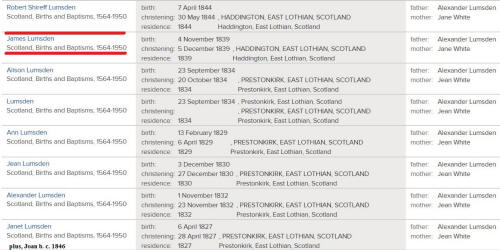
The 1851 Census shows the
family of Alexander and Jean/Jane,who were present at the leased farm Nether
Hailes. It includes James, aged 10.
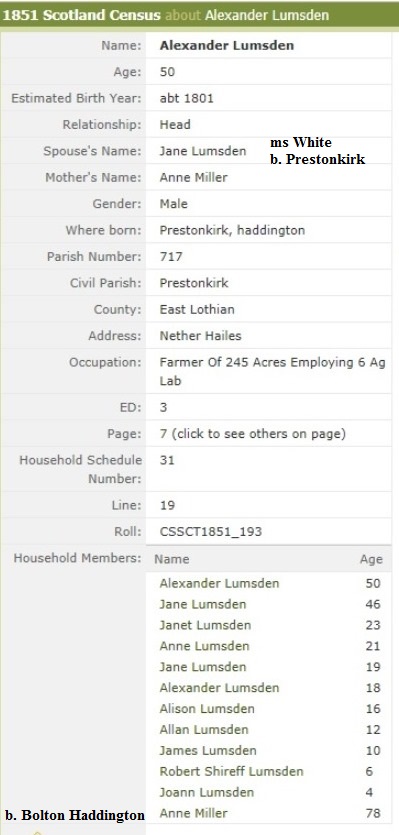
Jean/Jane (White) Lumsden
died before 1854, as can be seen from the 1854 2nd Marriage of Alexander
Lumsden, born 1801. Alexander's 2nd wife was a widow Alison (Coltman) Bell,
who had married a John Bell in 1832.


James (b.1839) and his
siblings' step-mother ..... Alison (Coltman) Bell Lumsden ..... died in
1860, thus leaving their father, Alexander (b. 1801), a widower for the
second time.

The 1861 Census for Nether
Hailes in Prestonkirk shows widower Alexander, his 90 year old widowed
mother Anne Millar, and some of the rest of the family .... but not James
(b.1839), who was, it is suggested, travelling worldwide between 1860 and
1880.
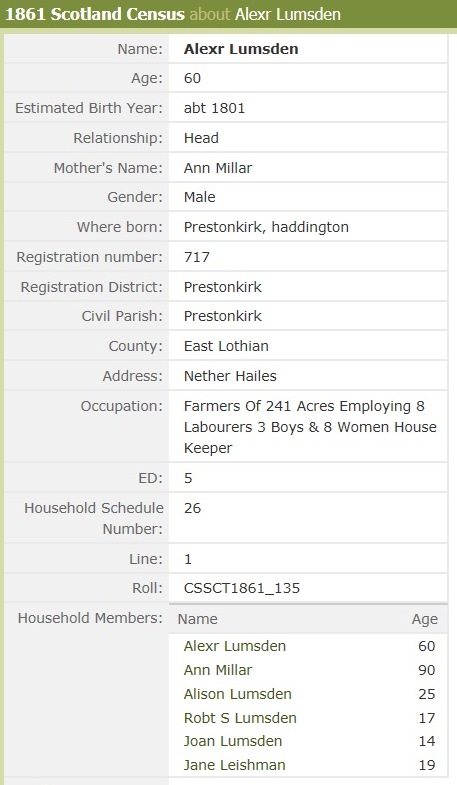
However, James (b. 1839) does
reappear at Nether Hailes in the 1880s, as shown by the 1881 Census, and his
registration of his father Alexander's death in 1888.
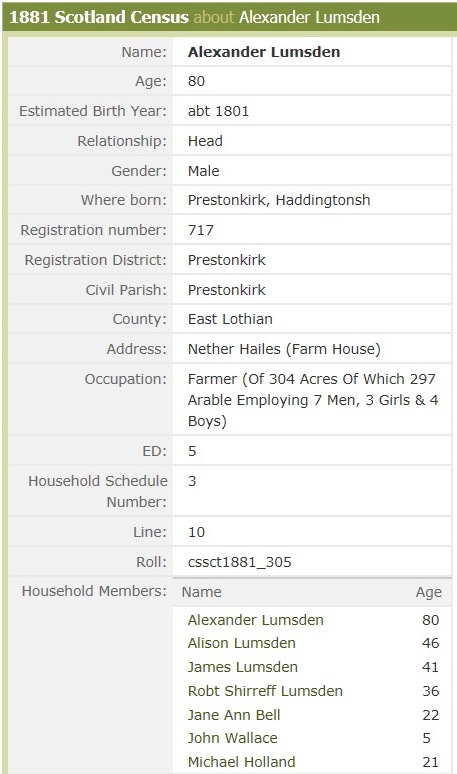

A summary of the known life
and career of James Lumsden (b. 1839) aka 'Samuel Mucklebackit' appears in
the records of the 'John Gray Centre' in Haddington .....
"He was born at Abbey Mill,
Haddington on 4 November 1839, one of a large family. His father, a miller
and then farmer, experienced both good times and bad, eventually losing his
lease after a series of bad harvests. Lumsden’s mother died when he was
young and his father’s second wife appears to have had hints of the ‘wicked
step-mother’ in her character. James began work early but never settled:
such details as are available are difficult to substantiate but sojourns in
various parts of Scotland, Ireland, England and Canada may provide some of
the reality behind Mucklebackit’s supposed adventures. By 1861 he had
inherited a brother’s lease of the farm Chesters, by Garvald: it expired in
March 1873. A gap in his oeuvre in the Haddingtonshire Courier provides
space for his Canada trip, as does the context of works published after his
return in mid 1874. His return seems to be associated with the family’s
struggles to make a go of Nether Hailes. James seems to have had varied
employment, supplemented by his writing: books as well as articles and poems
in the local press flowed from his pen. He still had time to marry (at the
age of 51) the widow, Isabella Black (Wood) Teenan, of Joseph Teenan,
another local poet. Thereafter, James and his adopted family moved to
Edinburgh where they lived until he died on 18 October 1909. He is buried in
Prestonkirk kirkyard."



'Samuel Mucklebackit' was
heavily influenced by Robert Burns and Robert Fergusson, and when on form
was able to inject humour and telling observation into his poems. His poetic
subjects were the events, people and places of East Lothian with diversions
into the wider world. His essays, of which there were more as time went on.
One commentator (Ian Meikle
in Scottish Book Collector, 2, 1990) observed: "The Samuel Mucklebackit
character is a curious one: a well respected model farmer; knowledgeable in
all things agricultural, rural, traditional, historical, religious and, of
course, political; a champion of the people. Perhaps as Mucklebackit,
Lumsden could venture down forbidden paths, passing on observations that
might otherwise be seen as too daring for the time. Today, they open a
window not otherwise readily available onto conditions and social life in
the second half of the nineteenth century."
The John Gray Centre in Haddington holds most of Mucklebackit’s works and
the index of microfilmed editions of the Haddingtonshire Courier points to
more.
James Lumsden's poem about Robert Burns and Robert Ferguson:-
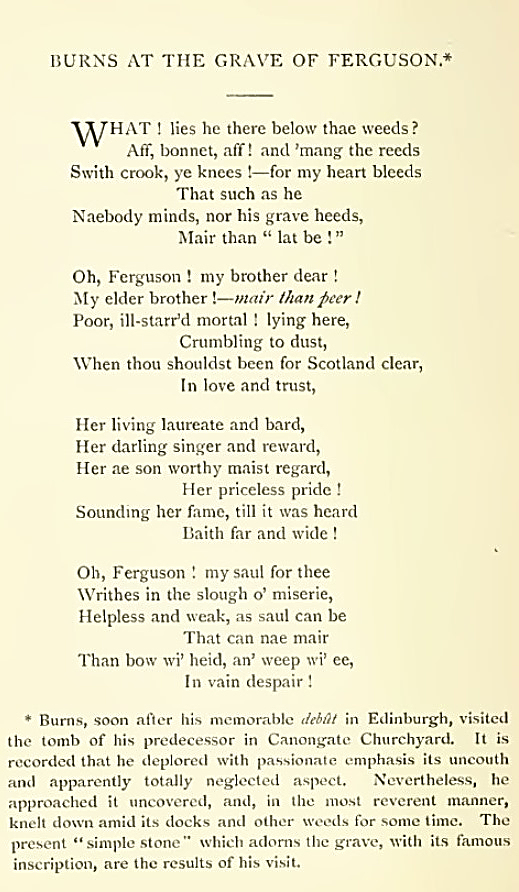
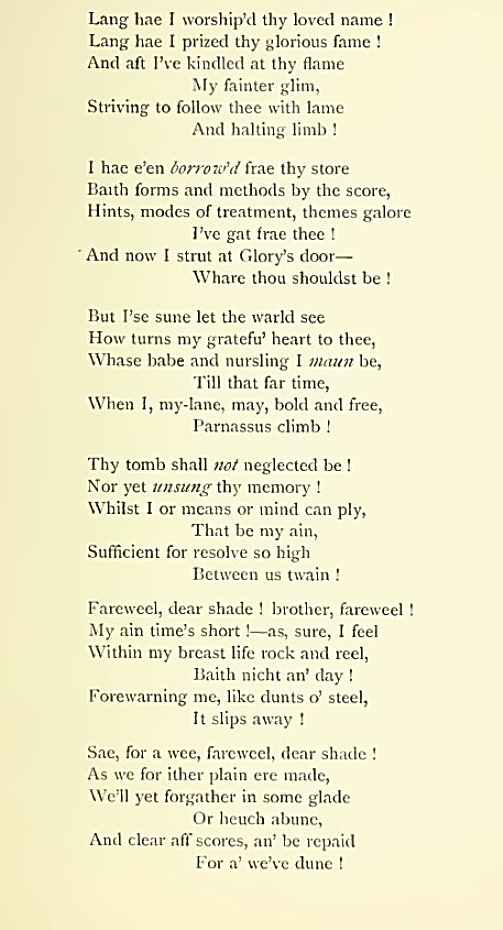
You can download and read,
Edinburgh
And Country Croonings' by Samuel Mucklebackit |

